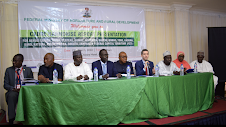COVID-19: Is Nigeria ready to avert imminent food crisis?

As a country with growing population, the outbreak of Corona virus (Covid-19) and the measures taken to control the spread of the virus would have a huge impact on food sufficiency. However, the recently released Cadre Harmonisé (CH) analysis report by the Food and Agriculture Organisation of the United Nations (FAO-UN), and its partners over a possible escalation of the food crisis in Nigeria calls for concern, ENEWA WILLIMS in this report, writes on the need to avert looming food crisis.
Before the outbreak of Coronavirus (Covid-19), Nigeria was considered food insecured due to increasing population, low food production, farmers/ herders’ crisis, insecurity and post harvest losses.
With the growing cases of the virus in Nigeria, particularly in Lagos State and the Federal Capital Territory (FCT), Abuja, citizens have been engaging in panic buying of food and basic supplies as they go into isolation in their homes. This could break the supply chain and cause more localized price hikes.
TheFact observed that the price of some basic food products had risen between 20 to 30 percent. The situation will only get worse if the virus situation persists.
While the agricultural sector should be less affected than others, illness-related labour shortages, transport interruptions, quarantine measures limiting access to markets and supply chain disruptions resulting in food loss and waste could affect supply.
On the demand side, a loss of purchasing power caused by the virus could change people’s eating patterns, resulting in poorer nutrition.
Amid the control measures, the FAO has called for immediate actions to minimize disruption to food supply chains.
The organisation in a statement issued by its Director General, QU Dongyu said coherent response is needed globally to prevent the outbreak of Coronavirus from triggering food crisis.
He noted that restriction of movement may impede farmers from farming, and food processors from processing, as well as shortage of fertiliser Veterinary medicine and other farm inputs could affect food production.
According to him, the COVID-19 outbreak, with all the accompanying closures and lockdowns, has created logistical bottlenecks that ricochet across the long value chains of the modern global economy.
“Restrictions of movement, as well as basic aversion behavior by workers, may impede farmers from farming and food processors (who handle most agricultural products) from processing. Shortage of fertilizers, veterinary medicines and other input could also affect agricultural production.
Speaking further on food security, Alliance for a Green Revolution in Africa (AGRA), also cautioned that the outbreak of COVID-19 shouldn’t lead to food crisis in Africa.
President of AGRA, Dr Agnes Kalibata, who made this known in an article made available to journalists reiterated the need to make effort to ensure people have food, adding that food crisis is imminent.
Dr Kalibata who noted that already 250 million people in Africa are without food, said these vulnerable population will suffer more from both the short- and long-term effect of the pandemic.
While noting that the movement restriction imposed in some African countries is a step towards curbing the spread of the disease, she said the implication on food production should also be considered.
Furthermore, the recently released Cadre Harmonisé (CH) analysis have shown that food crisis is imminent in Nigeria if the country fails to maintain the current positive food and nutrition security trend and possibly improve on it.
The CH was introduced in Nigeria in 2015 with the maiden analysis done in October 2015 in eight (8) states. Subsequent analyses done were in March 2016 (also in 8 States); August 2016 (special for Borno, Yobe and Adamawa); October 2016 and March 2017 (in 16 states), October, 2017 and Mar 2018 (in 16 states and the Federal Capital Territory, FCT); October 2018 and 2019 (in 16 states and the FCT) and March 2020 in 16 states and the FCT.
The CH has been adopted as the regional framework for consensual analysis of acute food and nutrition insecurity situations across 17 ECOWAS countries in the Sahel and Sub-Sahara West Africa since 2007.
Its process is in Nigeria is jointly led and facilitated by the Federal Ministry of Agriculture and Rural Development, in collaboration with Ministry of Health, National Bureau of Statistics (NBS), National Emergency Management Agency (NEMA), Nigeria Metrological Agency (NIMET) among others and UN organizations, the Food and Agriculture Organization of the United Nations (FAO) and World Food Programme (WFP).

Other partners are the Permanent Interstate Committee for Drought Control in the Sahel (CILSS), Famine Early Warning Systems Network (FEWSNET), The Nigeria Food Security Sector (FSS) Integrated Phase Classification Global Support Unit (IPC-GSU), Action Against Hunger (ACF), Save the Children international and others. At the regional level, the process is being coordinated and managed by CILSS.
The CH analysis adopts the Global Phase Classification (IPC) of food and nutrition insecurity where an area (country, LGAs, Zone and Ward) and estimated population can be classified in five (5) phases of food and nutrition insecurity namely minimal( phase 1), under pressure or stressed (phase 2), crisis (phase 3), emergency (phase 4) and famine/catastrophe (phase 5). Based on the CH analysis the vulnerable population needing urgent attention are those who are classified from phase 3 to 5 either in the current or projected period during the analysis cycle. The CH analysis is carried out twice (March and October) yearly.
According to the findings of the Cadre harmonisé analysis of March 2020, in the current period, over five million people in CH participating states of Nigeria are expected to be in the critical situation (phase 3) of food and nutrition insecurity or worse (phase 4 to 5) through March to May, 2020.
However, if no humanitarian (food and livelihood) support is provided, these figures are projected to increase to about seven (7) million people in the 16 northern states and the Federal Capital Territory (FCT), during the projected period (June to August, 2020), which is traditionally known as the lean season in the country.
The states included in the analysis were Bauchi, Adamawa, Gombe, Taraba, Yobe, Borno, Kano, Jigawa, Kaduna, Katsina, Zamfara, Kebbi, Sokoto, Niger, Benue, Plateau and the Federal Capital Territory (FCT), Abuja.
Regional analysis
Result of the CH analysis for the current period (March to May, 2020) shows that an estimated 3.2 million, 366 thousand and 1,54 million people respectively in the north-east, north central and north-west CH participating states are expected to be in crisis to worsen (phase 3 to 5) situation of food and nutrition insecurity. , while 4.1 million.
Analysis of the data gathered showed that during the projected period (June to August, 2020) these figures are expected to increase to about 4.1 million in the north-east, 549 in the north-central and 2.4 million in the north-west respectively if strategic driven humanitarian and resilience interventions to support the food need and livelihood of the vulnerable populations are not undertaken across the analyzed states.
However, about 273, 328 people in Borno State will be in emergency (phase 4) through March to May, 2020, while nearly 600, 000 people may face threat of emergency (phase 4), or worse food and nutrition insecurity between June to August in Borno and Yobe States.
The recent sporadic attacks by non-state armed group (Boko Haram) banditry and kidnappings continue to cause fatalities and large-scale population displacement resulting to significant negative impact on food and nutrition security outcomes (food consumption, nutrition and mortality) as well as livelihood activities within both displaced and host community house-holds. The situation continues to be particularly alarming in some north east (Borno, Adamawa and Yobe) and north west (Katsina and Zamfara) states which host large numbers of internally displaced persons (IDPs).
In Taraba State also reported insignificant displaced persons in the state due to the conflicts from in neighboring Cameroon while Kaduna and Plateau State had significant number of displaced person from farmers/herders conflict. The nutrition situation remains of concern in Kebbi, Bauchi, Kaduna, Adamawa,Yobe and Borno (MMC and Jere LGAs) States where the projected IPC acute malnutrition report shows that 921,618 children (0-69 months) suffered from global acute malnutrition; with global acute malnutrition (GAM) rate across the three North East States of Adamawa, Borno and Yobe estimated at 6.2%, 12.4% and 12.8% respectively. The deteriorating nutritional situation is driven by poor diet quality and quantity and high disease prevalence (diarrhea and measles), poor child care and wash practices occasioned by conflict.
The need to sustain CH analysis in Nigeria
FAO Representative ad interim in Nigeria, Mr Alhassan Cisse, said the organization would continue to work with her partners in the provision of livelihood assistance to the vulnerable group identified through this process. He noted that CH analysis in Nigeria have become the major yardstick for identifying the area at risk and estimating the population of vulnerable people in needs of humanitarian assistance and at such said the FAO is willing to support the government to take full ownership of the process, and expand it to other states.

In his statement, Cisse lauded the emergence of new crop of smart and skilled analysts from diverse background (National and State CH task force from government MDAs and 16 l CH participating states and other INGOs and LNGOs who participated in the recently conducted certification training in Kano and the follow up training for FSS partners based in the North East.
He further reiterated his confidence in the analyst saying, “I am confident that with these team of active human resources, Nigerian government will not only continue to sustain the conduct of CH analysis but also put measures in place to institutionalize the process, as part of the early warning system in the country for addressing food and nutrition insecurity.
“We are willing to support the government to take full ownership of the process, and expand it to other states. At present, donors are responsible for the financial sustainability of the CH, we truly commend them for this.
While noting that the CH analysis has served as a decision-making tool, he explained that it helps prevent food crisis by identifying affected areas and the populations for food and nutrition security and livelihood.
He said the improvement has largely been due to the efforts of government and massive intervention of the humanitarian communities, without which the situation would have worsened.
Mr Cisse further noted that the conduct of CH analysis in Nigeria has its own peculiar challenges such asthe paucity or limited availability of timely data on food and nutrition outcomes that everyone must brace up to address. Cisse however lauded the improvement in data availability by the Nigeria food security sector particularly for the partially /completely inaccessible area in Borno State which has helped to provide insight on the food and nutrition insecurity situation in the March 2020 round of the CH analysis.
As a way of improving the availability of timely data for the CH analysis, the Country Representative of Famine Early Warning System, FEWS NET, Mallam Isa Mainu, stated that the organization has been supporting the CH analysis from inception with data and other technical support and reiterated the need to establish the Nigeria National Early Warning System for the country.
Mainu who said FEWSNET is willing to support timely food commodity price availability for the CH process in Nigeria, stated that the organization is expanding her activities through the monitoring of cross boarder markets with a view to examining the impacts of cross border flows on food security in Nigeria.
Stakeholders’ recommendations
In response, Stakeholders at the March 2020 CH analysis result presentation called for the Implementation of sustainable agricultural and non-agricultural policies to increase income-generating activities that will impact positively on food consumption, livelihood and nutrition at household level. The stakeholders noted that to achieve this objective, there is a need to focus on addressing the limitating factors to food and nutrition insecurity such as malnutrition, insecurity, conflict, poverty, inequality and constrained access to productive assets and decent employment.
Furthermore, they reiterated the need for the government to sustain military operations in troubled areas with a view to opening up access to completely and partially inaccessible areas .which is crucial for improving the livelihood and self-reliance of the affected poor to reduce total reliance on humanitarian food assistance as well as prevent further deterioration of the food and nutrition insecurity during the lean season (June – August 2020) in the concerned states and relatively in the country at large.
Also, a group of indigenous Agro Business investors, Agriculture Bureau Association of Nigeria also warned that if the country fails to act fast following the outbreak of Corona Virus, it may be facing a crisis of food supplies like it has never seen before.
The group in a statement signed and issued by its coordinator, Suleman Dikwa, said if the uncoordinated production and distribution of food stuff continue, the country is at risk of food shortages for large portions of the population, extreme inflation of food prices and massive food wastage.
Dikwa who is also the Managing Director of Green Sahara farms harped on the need for government to immediately identify key players in the food supply chain, track levels of food availability and manage supply and distribution as it would require better linkages between users and producers.
The group called on the Ministry of Agriculture and Rural Development to lay out a COVID-19 Emergency Food Security Preparedness Plan. “This plan should clearly spell out details of a strategy to release more food into the system based on needs in particular towns at specific points in time; a strategy to ensure prices of food do not spiral out of control and to avoid hoarding; and a strategy to ramp up food production in these times when some farmers are not going out to the fields to harvest and traders are not transporting products because people are staying home.”
The statement said the plan should include a “collaborative strategy among the different players in the food security value chain that ensures the food supply does not get cut even in times of a lock down.
We need to bring in all active players in the Agriculture and allied industry ,the pharmaceutical companies ,the logistic companies into and emergency mode and develop a strategy to keep our supply chain running”, he said.
“Shutting down the food chain would kill more people than the virus stressing the need to take data of resources within our geographical area”, he said.






